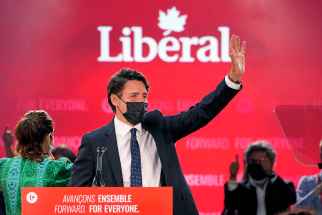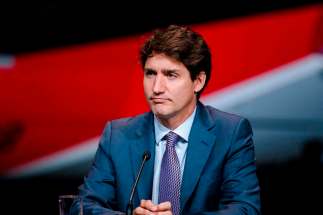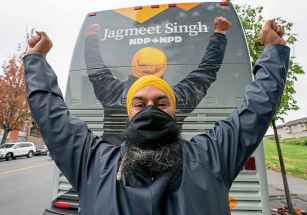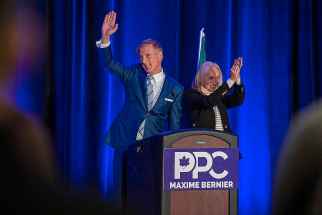Trudeau pays for the election he called that nobody wanted
Read this article for free:
or
Already have an account? Log in here »
To continue reading, please subscribe:
Monthly Digital Subscription
$0 for the first 4 weeks*
- Enjoy unlimited reading on winnipegfreepress.com
- Read the E-Edition, our digital replica newspaper
- Access News Break, our award-winning app
- Play interactive puzzles
*No charge for 4 weeks then price increases to the regular rate of $19.95 plus GST every four weeks. Offer available to new and qualified returning subscribers only. Cancel any time.
Monthly Digital Subscription
$4.99/week*
- Enjoy unlimited reading on winnipegfreepress.com
- Read the E-Edition, our digital replica newspaper
- Access News Break, our award-winning app
- Play interactive puzzles
*Billed as $19.95 plus GST every four weeks. Cancel any time.
To continue reading, please subscribe:
Add Free Press access to your Brandon Sun subscription for only an additional
$1 for the first 4 weeks*
*Your next subscription payment will increase by $1.00 and you will be charged $16.99 plus GST for four weeks. After four weeks, your payment will increase to $23.99 plus GST every four weeks.
Read unlimited articles for free today:
or
Already have an account? Log in here »
Hey there, time traveller!
This article was published 20/09/2021 (1572 days ago), so information in it may no longer be current.
When he called a snap election in mid-August, the entire country knew Liberal Leader Justin Trudeau was putting his government on the line because he badly wanted a majority.
After 36 of the angriest days of campaigning the country has ever seen, what he got instead was a near-death electoral experience. It was a win, but one that felt so much more like a loss.
The harsh reality is the new Liberal minority government is going to be led by a man who has confounded millions of Canadians with his rampant political ambition. Trudeau won his third federal election in six years but in the process, he has galvanized himself as both a political asset and an enormous political liability.

While he wasn’t punished for calling an early election, he was denied his majority. That suggests voters, as much as they did not see a need to put an end to his political career, are saving some of their contempt for a future election.
Not to borrow too heavily from a Conservative campaign talking point, but it certainly does seem to have been a colossally bad idea to waste $650 million on an election during a pandemic that produced a Parliament nearly identical to the one Trudeau dissolved last month.
On that basis alone, Trudeau has some explaining to do — not just to Canadians, but also to his own party — about what it was exactly he and his advisers saw in the political tea leaves that convinced him to call such an improbable election.
Some of the Liberal strategy is the conventional wisdom about snap election calls.
If we’re honest with each other, we should acknowledge that governing parties with minority mandates are always looking for a reason to call an election and improve their position. Even though there have been some backfires, in most instances snap elections do tend to work out for the governing party. That is largely due to the fact most voters, even if they disagree with the timing of the election, get over their apprehension by voting day.
Former Conservative prime minister Stephen Harper called two snap elections — one in 2008 and another in 2011 — and was soundly criticized in both instances for proroguing Parliament for purely political reasons. And he was re-elected in both instances, the second time with a majority.
So, even though it had been only 23 months since the last election, there were signs it was time to leap at a chance to win a majority.
Trudeau may have won the election, but he absolutely lost the trust and faith of millions of Canadians. And one way or the other, there will be a day of reckoning for that.
By early summer, it was clear the federal government’s vaccine procurement program was going to be a success. Notwithstanding early concerns about supply, by summer, Canada had caught up to and surpassed most other countries — particularly the United States, the United Kingdom and Israel — in both supply and numbers of citizens being vaccinated.
Trudeau also announced pandemic economic supports would be extended, a decision that seemed to galvanize the idea the Liberals were the right party to govern in a public health crisis.
By late July and into early August, the country’s pandemic honeymoon with the Grits was in full bloom. The Liberals were intoxicated by their double-digit lead in most opinion polls, and that would turn out to be the siren call that drew Trudeau to the idea he should have an early election.
But Trudeau clearly misjudged one important difference that distinguished this election, and this period in the country’s history. The pandemic, and the Liberal government’s response to it, may have helped build support for Trudeau, but it also left the country mentally and physically exhausted.
When push came to shove, Canadians didn’t want this election because they had too many other, more important things to worry about. They were generally OK with the government and its pandemic strategy; putting all that in jeopardy with an unnecessary election was too much for too many Canadians to bear.
Or, to put it more precisely, it was the straw that broke the Liberals’ majority hopes.
In some ways, this may be remembered as the election the Conservatives and leader Erin O’Toole lost. And as clever as their campaign was early on, the Tories proved they are — thanks to policies that run directly against the majority of public opinion in Canada — the Liberals’ secret weapon.
Perhaps Trudeau knew O’Toole was going to stumble through mini controversies on abortion, banning assault-style firearms or his ineptitude on the issue of vaccine mandates.
If the snap election call ended Trudeau’s dream of a majority, O’Toole’s campaign helped sustain the Liberal minority. That’s a harsh judgment for a party that has actually received more votes that the Liberals in each of the last two elections. But it’s also a true and fair assessment.
Liberals may have gone to sleep after the results rolled in thinking they got away with one. And in many ways, they did. Sort of.
Trudeau may have won the election, but he absolutely lost the trust and faith of millions of Canadians. And one way or the other, there will be a day of reckoning for that.
dan.lett@freepress.mb.ca

Dan Lett is a columnist for the Free Press, providing opinion and commentary on politics in Winnipeg and beyond. Born and raised in Toronto, Dan joined the Free Press in 1986. Read more about Dan.
Dan’s columns are built on facts and reactions, but offer his personal views through arguments and analysis. The Free Press’ editing team reviews Dan’s columns before they are posted online or published in print — part of the our tradition, since 1872, of producing reliable independent journalism. Read more about Free Press’s history and mandate, and learn how our newsroom operates.
Our newsroom depends on a growing audience of readers to power our journalism. If you are not a paid reader, please consider becoming a subscriber.
Our newsroom depends on its audience of readers to power our journalism. Thank you for your support.
























